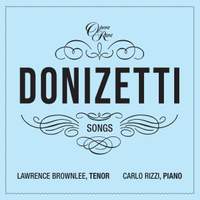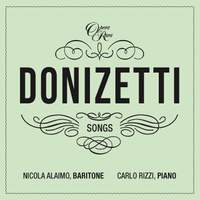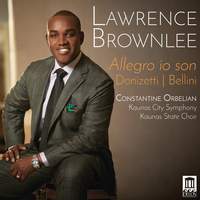Interview,
Lawrence Brownlee on Donizetti's songs
I spoke to Lawrence Brownlee a few days after his Wigmore Hall concert with Carlo last September to find out more about Donizetti's evolution as a vocal composer, the different sides of his musical personality which are revealed in the previously-unheard songs, why Lawrence believes that much of this music is a gift to voice-teachers and their students - and how the project reminded him that performing informally for friends is simply good for the soul...
How many of these songs were new to you when you embarked on this project?
About 90 per cent of them! The project was birthed by Opera Rara and Roger Parker, because they had found some manuscripts that had never been recorded or even performed since the time of Donizetti. Many of these pieces were written for his friends to sing at parties, so the public didn’t have access to them. My career has been dominated by mostly Rossini and secondly Donizetti, so I feel like I have a sense of the composer’s style: doing this project seemed right up my alley!
I actually recorded ‘Me voglio fa' 'na casa' and ‘L’amor funesto’ on my debut album for EMI Classics nearly twenty years ago: I listen back to it now and think ‘Oh my gosh!’. That was pretty early in my career, but hopefully I’ve matured and have a better understanding of what the composer intended.
Which particular songs stood out to you, and can you see them gaining a foothold in the recital-repertoire?
There were many pieces where I thought ‘Wow, this is a jewel right there!’. One that really spoke to me was ‘Ella riposa’, which is almost like an aria: it opens with such a wonderful recitative, followed by a cavatina and a cabaletta. It’s obvious that some of these songs were developmental pieces, and we see the benefits later on in Donizetti’s operas: the final song, ‘Il sospiro’, seems to be a precursor to Edgardo’s scene in Lucia di Lammermoor. Many of the bel canto composers stole from themselves anyway: you can sense them thinking ‘This is a winner, I’m going to use it again!’.
So many of them are great teaching-tools. Young singers are naturally eager to dive right in with the big pieces: I remember thinking ‘Oh, maybe I could sing Lucia!’ when I was about 18, but you should probably get a bit more study under your belt before touching that! These songs are good introductions for tackling that more sustained stuff, because you can still get a feel of the bel canto style without having to push the voice too hard.
And they don’t have those taxing high notes that you have to hold for fifteen seconds…you don’t need to sing the top E flat in Lucia just yet, but you can give about 80% of what Lucia might need in a way that’s healthy for a developing voice. I’m on faculty at the Juilliard School, where a friend and I are going to present some of these pieces for students who’ll hopefully be inspired to explore them.
Was it always obvious to you which songs dated from Donizetti’s early career and which ones were written at the height of his fame?
There was obviously some maturation which happened before he became the Donizetti that we know and celebrate today. 'Ella riposa', which I mentioned earlier, is probably a little later because you can see that the structure’s more advanced. In the less developed songs the range wasn’t quite as full, and the contour of the vocal line wasn’t quite what it became. Like many composers, Donizetti's understanding of the voice grew over his career – composers are often instrumentalists rather than singers, so it sometimes takes time for them to realise that the extremes of range can’t be called upon in the same way.
You need a proper understanding of things like vowel- structure, for instance knowing that you can’t write a high E flat on an 'ee' vowel - if you go for an 'ah' or 'oh' then the voice has a better chance of being able to access that without tension. As a fledgling composer, the opportunity to write for soirées and have singers trying things out was probably very helpful to Donizetti: I imagine he listened and took notes!
Is it fair to say that we see facets of Donizetti’s musical personality here which don’t get showcased so much in the operas?
Absolutely: my first introduction to Donizetti was through things like Don Pasquale and La fille du régiment, which are of course comic operas but you still don’t see his playful side to the same extent as you do in some of these songs. A few years ago I had the chance to sing the aria ‘Allegro io son’ from Rita, and that is one which I think shows the playfulness that you also see in songs like ‘Me voglio fa' 'na casa’.
These pieces really show you Donizetti’s range: sure, he had the ability to write for the top-drawer voices of his generation, but he could also cater for non-professional singers who just wanted to get up and have fun at parties! I love that approach to sharing music. When I was at college we’d hold Schubertiades where people would bring songs they hadn’t studied but just heard or wanted to explore; everybody wasn’t at the same level, but we’d fix a pianist who could sight-read and just try things out for the joy of it.
A lot of these Donizetti songs were born out of that same type of atmosphere. I love period movies, and you often see scenes where regular people will sit down at the piano and sing or take out a violin just to entertain one another – obviously they didn’t have TV or the internet or go to the symphony every day, so this was their opportunity to be expressive from an artistic standpoint.
That experience of sharing music with friends just does something for you, regardless of the level of artistry involved. I’ve been fortunate enough to share stages with some of the finest singers alive, but someone doesn’t have to be at that level in order to touch me. Sometimes hearing an eighteen-year-old student who’s able to captivate me has the same effect, or perhaps it’s an amateur who just loves to sing: maybe they studied music in college and then became a lawyer, but they obviously still deeply appreciate music and give it their all. Creating a space, time and intention for people to come together just as they are is a very special thing.
The programme does include a smattering of vocal fireworks - you ping out a fair few top Cs on this recording!
Indeed: I’ve always lived for those high notes, but often it’s the lead-up to them that’s the real challenge! You really need to pace yourself when you’re recording this stuff, and that debut recording with Martin Katz was such a learning-experience for me on that front. Before we went into the studio, I assumed we’d just be aiming for the perfect complete take, but Martin quickly disabused me of that notion: I remember him saying ‘The idea is that we can retain something every time we hit the record button, so bring your expressivity and don’t be afraid to make mistakes!’.
Experimenting with colours, dynamics and variations really brings these songs to life, and with wonderful engineering and editing we were able to put together something that sounds organic even if it wasn’t done in a single take. Often it was about breath-management: if I took a breath mid-phrase on the first take then I was mindful to avoid it the second time, because I wanted to have that sense of continuity.
Your partner this time around is Carlo Rizzi, more commonly heard as conductor rather than pianist: what’s the story behind your relationship?
Carlo and I have done three or four operas together (including La cenerentola and Il turco in Italia) plus a few concerts and our friendship has developed over the years, so when Opera Rara asked me to be involved with this project with him I jumped at the chance. He has a real understanding of the style, performance traditions and practices of this music - perhaps being Italian helps, although of course that isn’t a prerequisite!
I really respect Carlo as an artist, and I know that he respects me right back – some conductors like to tell you exactly what to do, but Carlo was always open to my ideas as someone who primarily sings Donizetti and Rossini. Quite often he’d say ‘Oh, I didn’t think of it that way, but if it works then feel free’ or ‘Actually that’s a better tempo for me too, Larry!’. And at other times he’d say ‘I do want to push you on this one: I think it works better for the piano if you understand the left hand is doing something agitated’. It’s about synergy, and also knowing when to yield to one another.

Lawrence Brownlee & Carlo Rizzi in the recording-sessions (photo: Russell Duncan)
That meant that the recording process was pretty easy – even though recording 28 songs was a tremendously ambitious undertaking, because of course you’re not just doing each song once. Carlo saved me in places by telling the engineers ‘We’re not going to do that again...we have to be mindful of vocal health’. I wasn’t completely well when we did our Wigmore Hall concert together last September, and I could already feel the effects of getting sick in the sessions – but all the high Cs still had to be recorded, and thankfully my voice held up! It's so often the way: I remember reading that Pavarotti said he had about two perfect singing-days in his life, and he didn't have gigs on either of them...
In terms of new opera roles, what’s on your bucket-list for the next few years?
I was discussing this with my friend [Italian conductor] Speranza Scappucci just the other night. I got my opportunity to start singing things like Il barbiere di Siviglia and La cenerentola internationally when I was 27 or 28, and they still fit me well at 51…but when I see guys in their late twenties who are ready to sing these operas in major houses I’m excited for them to get going! I don’t have the monopoly on Tonio, Almaviva or Ramiro, but what else is there for me to take on when I leave them behind?
My voice has taken on more colour and depth lately, so I’m thinking of exploring things like Lucrezia Borgia and Linda di Chamounix over the next three years or so - and looking beyond Donizetti, maybe also Il pirata and Guillaume Tell. Many of my contemporaries are singing roles like Roméo, Rodolfo and Hoffmann, but I’m not going down that path. I’ve been offered Idomeneo quite a lot, but it’s too low: I saw my friend Michael Spyres nail it at the Met in 2022 and thought ‘Nope, not for me!’.
Then there are rarities like Le duc d’Albe, which I’d love to sing if they ever came up: hopefully I’m at a point in my career now where companies could be persuaded to put these things on if they know I want to do them! The reality is that star singers drive ticket-sales: when I did Fille du régiment with Lisette Oropesa in Chicago last year, they added an extra performance because so many people wanted to see us together. I’ve been encouraging her to have a look at Lucrezia Borgia, because that would be a great opera for us both at some point in the future…
Lawrence Brownlee (tenor), Carlo Rizzi (piano)
Available Formats: CD, MP3, FLAC/ALAC/WAV
Nicola Alaimo (baritone), Carlo Rizzi (piano)
Available Formats: CD, MP3, FLAC/ALAC/WAV, Hi-Res FLAC/ALAC/WAV, Hi-Res+ FLAC/ALAC/WAV
Lawrence Brownlee (tenor), Kaunas City Symphony Orchestra, Kaunas State Choir, Constantine Orbelian
Available Formats: MP3, FLAC/ALAC/WAV, Hi-Res FLAC/ALAC/WAV
Lawrence Brownlee (tenor), Michael Spyres (tenor), I Virtuosi Italiani, Corrado Rovaris
Available Formats: CD, MP3, FLAC/ALAC/WAV, Hi-Res FLAC/ALAC/WAV







